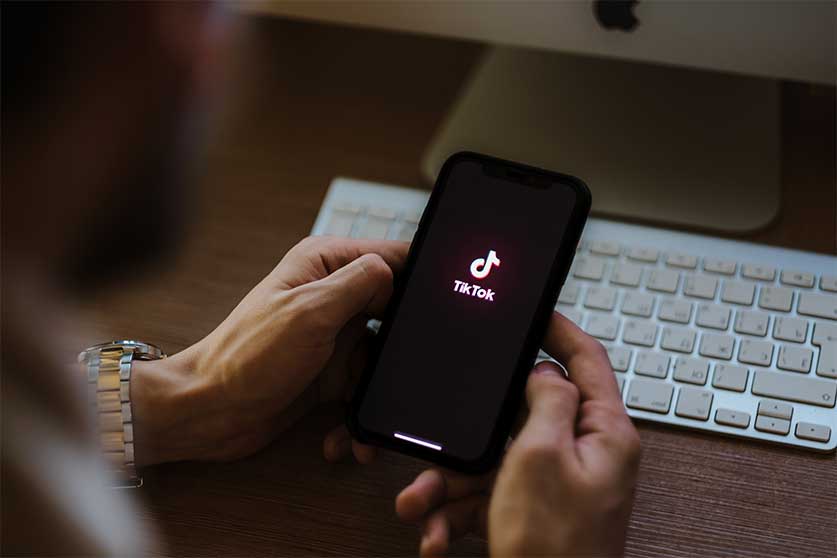Since launching in 2017, TikTok has quickly established itself as one of the most popular social media platforms in the world. Unfortunately, the app’s endless supply of short-form videos may cause symptoms of addiction in some people.
If you think you or someone you love might be addicted to TikTok, look for these signs.
Why Is TikTok So Addictive?
When scrolling through TikTok, you will see some videos you don’t like and some videos you do like. Each video you do like gives you a small hit of dopamine.
Dopamine is a neurotransmitter (brain chemical) associated with pleasure, reward, and motivation. It’s triggered by pleasurable activities such as eating, having sex, and listening to music.
It’s also triggered by addictive substances like heroin and cocaine, although to a much larger degree.
When you see a TikTok video you like, the surge of dopamine motivates you to seek out even more dopamine.
As a result, you keep scrolling to find more videos you like. This addictive process is known as random reinforcement. It’s the same process seen in slot machines, which are also addictive.
Here are five signs of TikTok Addiction:
1. Spending More & More Time On TikTok
Like addictive drugs, TikTok and other social media apps can cause tolerance in some people. That means they need to spend an increasingly larger amount of time on TikTok to get the desired amount of dopamine.
For example, some people only scroll through TikTok for a few minutes per day or week. Eventually, though, they may find themselves scrolling for hours. If the amount of time you spend on TikTok keeps increasing, you could be at risk of addiction.
2. Experiencing Withdrawal Symptoms When You Don’t Use TikTok
When people get addicted to drugs and stop using them, they may develop unpleasant withdrawal symptoms. This is a sign of physical dependence. Physical dependence means your body starts relying on drugs to function normally.
Some TikTok users develop a similar type of dependence on the app. When they can’t access it, they might experience anxiety, irritability, sadness, and other difficult feelings.
If you use TikTok on a regular basis, try going a few days without it. If your mental health plummets, you may have developed an addiction.
3. Using TikTok To Cope With Mental Health Problems
Most people use TikTok purely for entertainment. Other people, especially young people, use it to numb mental health concerns like low self-esteem, anxiety, and depression.
Indeed, TikTok videos can distract you from difficult feelings and situations. However, like self-medicating with drugs, self-medicating with TikTok often leads to addiction.
It can also make your mental health even worse.
Some studies suggest that TikTok and other social platforms intensify mental health issues in some users, especially adolescents. In addition, when you avoid your problems by constantly using TikTok, you won’t have the time or energy to actually solve those problems.
4. Using TikTok To Cope With Loneliness
Research suggests that many people who struggle with loneliness use TikTok to get a sense of belonging and validation. Like other social networking sites, TikTok allows users to develop online friendships and build communities based on a wide variety of topics and interests.
However, like people who use TikTok to self-medicate, people who use it to feel less lonely are more likely to get addicted to it. They may also become less likely to seek connections in real life.
As a result, they feel even more lonely and thus more reliant on TikTok, creating a vicious cycle.
5. Feeling Unable To Stop Using TikTok
No matter how often you use TikTok, you should be able to stop when you want to. If quitting or cutting down on your TikTok use feels impossible, you’re likely addicted to the app.
Many people who feel unable to quit TikTok find themselves thinking about the app all day.
As a result, they may struggle to focus on work, school, or other responsibilities. They may also lose interest in relationships and activities they once enjoyed. Ultimately, much like drug addiction, TikTok addiction can take over your whole life.
If you or someone you love struggles with addiction, please reach out to Northeast Addictions Treatment Center. Our board-certified treatment providers offer behavioral therapy, aftercare planning, and other evidence-based services to help you or your loved one stay healthy.
Sources
Addictive Behaviors — Needs affordance as a key factor in likelihood of problematic social media use: Validation, latent Profile analysis and comparison of TikTok and Facebook problematic use measures
Frontiers in Public Health — Digital Media Use and Adolescents’ Mental Health During the Covid-19 Pandemic: A Systematic Review and Meta-Analysis
Telematics and Information — Exploring short-form video application addiction: Socio-technical and attachment perspectives



